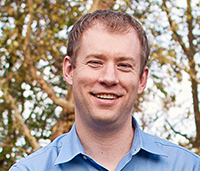Where are they now?
|
More AlumniKathryn BerlinAndres E. Carrillo Aleda Chen Krista Cline Katie Hill Gallant Megan Gilligan Kimberly Hurley Heidi IglayReger Jessica Kelley Seoyoun Kim Min-Ah Lee Mary Marshall Megan MacPherson Lauren Parker Lindsay Pitzer Markus Schafer Jori Sechrist Amber Seidel Tetyana P. Shippee John Spruill III April J. Stull Anusha Sundarrajan Roland J. Thorpe Kyle Timmerman Nicholas Turiano Lori Ward Oliver Wendt Lindsay Wilkinson Tim Wright |
Markus Schafer, PhDMarkus Schafer is currently an assistant professor in department of sociology, University of Toronto. His research lies mainly in the area of health and aging. Some of the topics that interest him include the risks of obesity and its consequences, adult health problems associated with childhood misfortune, subjective aspects of aging, and the influence of health on social networks among older adults. Why did you get interested in the study of aging?I came to Purdue initially interested in studying medical sociology, but I soon realized that the aging and health nexus was the best fit for me. As a master’s student I had the opportunity to live in a nearby retirement community—Westminster Village—as part of a program that had just launched a few years before I came to Purdue. The Bridge Program, as it was called, was a partnership between CALC and Westminster where a graduate student could live in a (very posh) apartment and experience what life was like as a full-fledged retirement community resident. I thought the idea was very unusual, but I was curious. So I lived there a year, and it ended up piquing my interest in the study of aging. What were some of the most important experiences you had at Purdue that helped shape your career as a professor?CALC is first-rate. I had so much exposure to cutting-edge ideas through the yearly symposia and other events that brought in leading aging researchers. The dual-title Gerontology program was also rewarding. My favourite courses were those taught by Dave Waters—both his biology of aging course and another reading seminar on skill development that I had the privilege to take. Waters taught me to think in a genuinely interdisciplinary way and he inspired me to write more clearly, read more broadly, and to work harder at spotting connections between ideas. In what ways do you infuse ideas from your study of aging into courses that you are now teaching?I have had the privilege to teach a sociology of aging course at University of Toronto. After moving to the University of Toronto, how has your research program changed?Since coming to the U of T I’ve continued to do work on the connection between childhood conditions and adult health and on the social networks of older people (my dissertation topic at Purdue), but I’ve also recently begun to explore the sociology of religion. |
